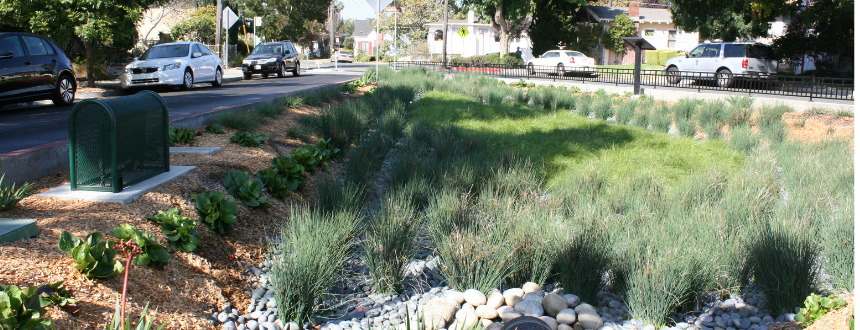
Stormwater curb extensions and overflow structures, City of Burlingame, Carolan Ave., photos courtesy of Matt Fabry
Stormwater runoff begins when rainwater falls on impervious surfaces, including roads, rooftops, and parking lots. Unable to soak into the ground, stormwater runoff carries trash, bacteria, heavy metals, oil, and other pollutants. Stormwater runoff is a major source of water pollution in most urban areas, which captures it in engineered collection systems and discharges it into nearby water bodies. High rainfall events can cause erosion and flooding, which damages property, infrastructure, and habitat.
Green infrastructure and low impact development are ecosystem-based approaches to constructing stormwater controls that mimic the natural environment in an urban environment. These approaches use natural processes, vegetation, and soils to manage stormwater, providing habitat, water storage, flood protection, cleaner water, and cleaner air. Compost and mulch are components of green infrastructure and low impact development used to improve soil properties and thereby increase water infiltration and storage, improve plant establishment and health, reduce stormwater runoff, and absorb and retain pollutants.

Rain garden retrofit replaced excess asphalt as part of green infrastructure project in Berkeley, photo courtesy of Matt Fabry
Green infrastructure and low impact development systems and treatments that use compost and mulch include the following:
Benefits
- Increases water infiltration
- Increases soil water holding capacity
- Absorbs and retains pollutants
- Helps establish healthy vegetation
Resources
- San Mateo County – Green Infrastructure Design Guide
- USEPA – What is Green Infrastructure?
- USEPA – Green Infrastructure
- Green Infrastructure and HUD Sustainable Communities Initiative
- USEPA – Green Infrastructure Opportunities and Barriers in the Greater Los Angeles Region
- California Water Boards Guidance for Design and Construction of Vegetated Low Impact Development Projects
- USEPA – Urban Runoff Low Impact Development
- California Stormwater Quality Association (CASQA) – California LID/Green Infrastructure:
- Sacramento Stormwater Quality Partnership – Sacramento LID
- Caltrans – Low Impact Development
- Building Healthy Soils with Compost to Protect Watersheds
- Stormwater Management Methods and Opportunities for Compost Use
- California Stormwater Quality Association – CASQA Stormwater BMP Portal
- Low Impact Development Manual for Southern California – Technical Guidance and Site Planning Strategies
- Compost Research & Education Foundation – Compost Specification Sheet for Bioretention Media
Research
Faucette, L.B. et al (2005). Evaluation of stormwater from compost and conventional erosion control practices in construction activities. Journal of Soil and Water Conservation. 60(6):288-297.
Resources
For more information contact: Organic Materials, organics@calrecycle.ca.gov

